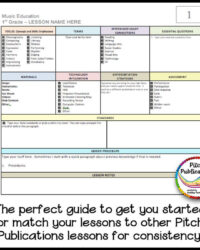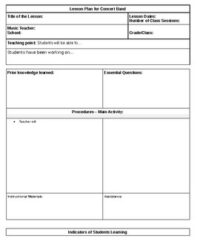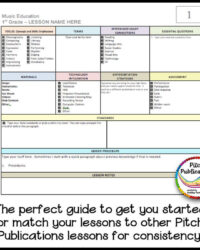Ever walked into a choir rehearsal feeling a little… unprepared? You know what needs to be done, but the order, the flow, and ensuring every minute is productive can sometimes feel like trying to herd cats. We’ve all been there! The truth is, a well-structured rehearsal isn’t just about getting through the music; it’s about fostering growth, building community, and making the most of everyone’s valuable time. That’s where having a clear, actionable plan becomes your superpower, transforming chaos into harmonious progress.
Imagine a rehearsal where every singer knows what to expect, where transitions are seamless, and where you, as the director, feel confident and in control. This isn’t just a pipe dream; it’s the reality that a thoughtful choir rehearsal lesson plan template can help you achieve. It’s your roadmap, ensuring you hit all your musical and pedagogical goals without missing a beat, leaving everyone feeling energized and accomplished.
Crafting Your Perfect Choir Rehearsal Lesson Plan
Developing a robust choir rehearsal lesson plan is more than just jotting down a few songs. It involves thoughtful consideration of your choir’s current skill level, their learning styles, and the specific objectives you aim to achieve within that session and across the entire rehearsal cycle. A well-designed plan provides a framework that allows for both structure and the flexibility needed to respond to the group’s needs in the moment. It ensures that time is used efficiently, allowing you to cover everything from vocal warm-ups to detailed musical phrasing, ultimately leading to a more productive and enjoyable experience for everyone involved.
Your plan should be a living document, something you can adapt and refine as you get to know your choir better and as their abilities evolve. Think of it as a blueprint for success, guiding you through each segment of the rehearsal. This systematic approach not only reduces stress for you but also builds confidence within your choir, as they quickly learn that your rehearsals are purposeful and progressive.
Setting Clear Objectives
Before you even think about what songs to rehearse, define your objectives for the session. Are you focusing on intonation for a specific section? Improving rhythmic accuracy? Or perhaps building blend and balance? Having clear, measurable goals will inform every decision you make when planning the rehearsal content. It allows you to tailor exercises and focus points, ensuring that every activity contributes to your desired outcome.
Warm-Ups and Vocal Technique
Never skip or rush this crucial segment! A good warm-up prepares the voice physically and mentally, while also serving as an opportunity to reinforce fundamental vocal techniques. This could include breathing exercises, articulation drills, pitch matching, or developing resonance. Integrate exercises that directly address vocal challenges present in your repertoire, making the warm-up an integral part of the learning process rather than just a formality.
Repertoire Work and Sectionals
This is often the core of the rehearsal. Prioritize your repertoire based on performance dates and areas needing the most attention. Break down complex sections, dedicating time to individual parts (sectionals) if necessary, before bringing everything back together. Vary your rehearsal techniques – use call and response, isolated phrases, or slow practice – to keep singers engaged and learning effectively. Remember to budget time for feedback and questions from the choir.
Cool-Down and Wrap-Up
Ending a rehearsal effectively is just as important as starting strong. A brief cool-down helps relax the vocal cords and transition singers out of performance mode. Use this time to also summarize what was accomplished, outline goals for the next rehearsal, and address any administrative announcements. A positive, organized wrap-up leaves everyone feeling good about their progress and looking forward to the next session.
Practical Tips for Effective Rehearsal Planning
Beyond the structural elements of a choir rehearsal lesson plan template, there are several practical considerations that can elevate your planning from good to great. Thinking about these aspects beforehand can help you anticipate challenges, maximize engagement, and ensure that every minute of your rehearsal is truly impactful. It’s about creating an environment where learning flourishes and singers feel valued.
One key aspect is flexibility. While a plan provides direction, be prepared to deviate if a particular section needs more attention than anticipated, or if your choir is struggling with a concept you thought they’d grasp quickly. Being adaptable allows you to meet your choir where they are, rather than rigidly sticking to a schedule that isn’t serving their needs. This responsive approach builds trust and ensures genuine progress.
Another crucial tip is to always plan for more material than you think you’ll need. It’s much better to have extra exercises or repertoire ready in case you move through your planned material faster than expected, than to be scrambling for filler content. This preparation demonstrates professionalism and keeps the rehearsal flowing seamlessly. Also, consider the energy levels of your choir; vary activities to maintain engagement, perhaps alternating between intense focus work and lighter, more enjoyable exercises.
- **Time Management is Key:** Allocate realistic time slots for each segment, building in buffer time for transitions or unexpected discussions.
- **Visual Aids and Resources:** Prepare any sheet music, lyrics, or projected scores in advance. Consider using a whiteboard or projector for visual cues.
- **Dynamic Rehearsal Techniques:** Don’t just drill notes. Incorporate expressive gestures, imagery, and storytelling to bring the music to life.
- **Regular Assessment:** Periodically assess your choir’s progress and adjust your plan accordingly. Are they meeting the objectives? What areas need more work?
- **Self-Care for the Director:** Ensure your plan also allows you moments to recharge. A refreshed director leads more effectively.
Embracing a systematic approach to planning your choir rehearsals will undoubtedly transform your experience as a director and elevate the performance of your choir. A well-prepared director instills confidence, fosters a productive learning environment, and ultimately leads to more fulfilling musical outcomes for everyone involved. It’s an investment in your ensemble’s success, paying dividends in improved technique, deeper musical understanding, and a stronger sense of camaraderie.
By utilizing a robust framework, similar to what you’d find in a comprehensive choir rehearsal lesson plan template, you create a foundation for consistent growth and remarkable achievement. It empowers you to tackle complex musical challenges with clarity and purpose, turning every rehearsal into a step forward on your collective journey toward musical excellence. So go ahead, plan with purpose, and watch your choir soar!


